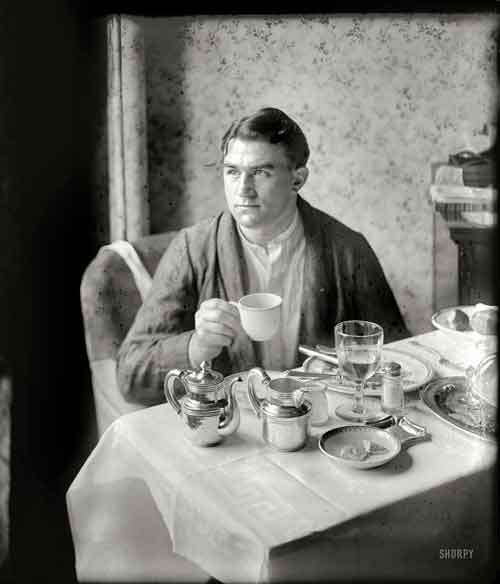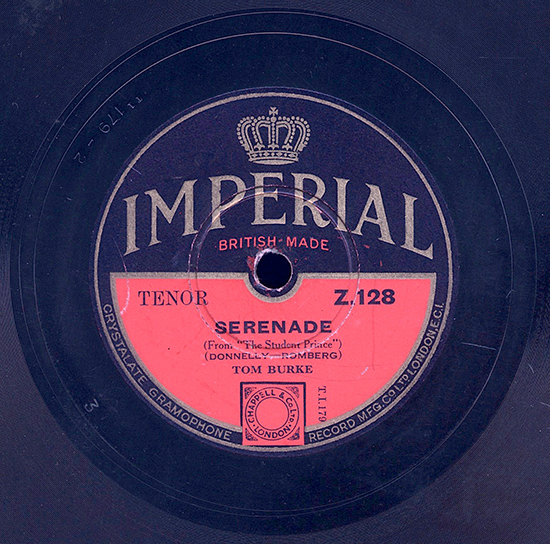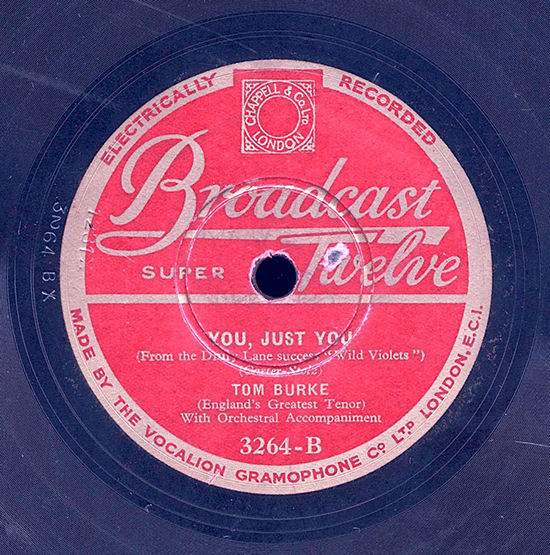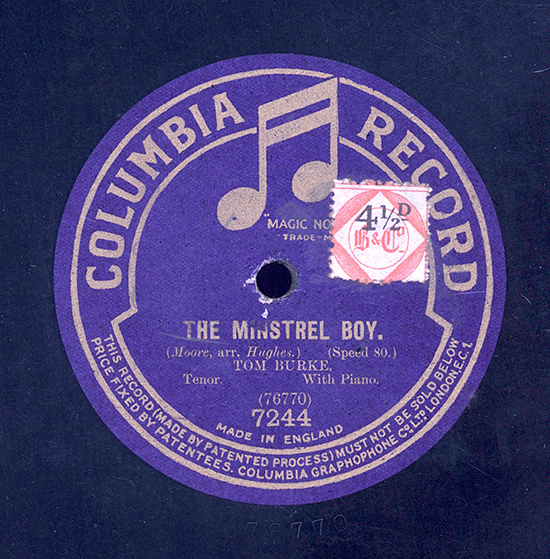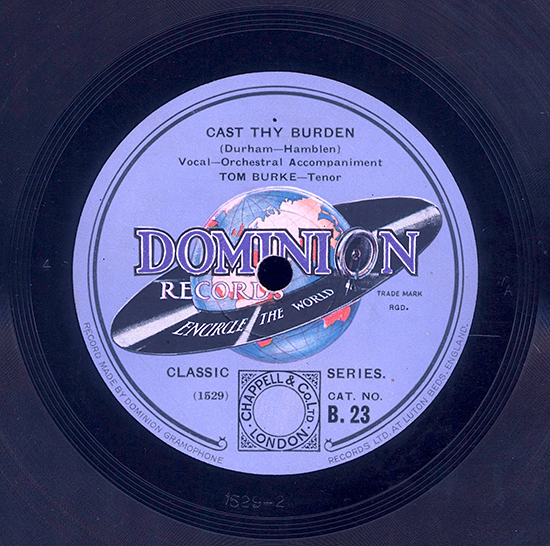Tom Burke: The Minstrel Boy
Thomas Aspinall Burke was born on March 2nd, 1890. He grew up in poor circumstances. Burke's father, James Vincent Burke, came
to England from Wicklow in Ireland. He settled in the Lancashire town of Leigh. This is a manufacturing town. Most people
worked in the silk and cotton mills or in the coal mines. He left Ireland almost penniless but once he arrived in Leigh he
found a job labouring in a coal mine. He rented a house in Mather Lane, a poor area of the town. He married Mary Josephine
Aspinall (March 1889). She came from the nearby town of St Helens. Her parents descended from an Irish family and on the other,
a branch of Lancashire Urmston's. This was a household in which father's earnings were the principal source of their income.
Mum remained at home caring for their children.
Burke's father had a very pleasing tenor voice and almost every day when he returned from work he would sit his young son on
his knee and sing Irish lullabies to him. This was Burke's first introduction to music and it was an influence that awaked
something deep within Burke's soul because he grew up to be a boy who liked to sing.
Burke's father was interested in brass bands and through his father's encouragement he joined Leigh Borough Brass Band. In 1904
he was 14. He had learnt to play the cornet and he was promoted to first cornet player. The band competed in a national
championship at the Crystal Palace. Burke's solo cornet playing won him a silver medal for being the best.
Burke as an Irish Catholic boy attended St Joseph's School. He was educated by Jesuit priests. Burke was a clever scholar and
well above the average. He was always singing and humming tunes as he worked through his lessons. He left school before
finishing the program at age 12. The family needed money.
Burke left school to work in a local silk mill. The law only allowed children his age to work a limited number of hours. It was
not until he became 13 that he worked the full hours. He laboured on the machine operatives and swept up.
When Burke was able to work full time, there was more money coming into the household and Burke's father thought that a piano
should be bought for Burke. The family sacrificed much to get the money to buy it. Mum's sewing machine was pawned and weekly
payments were made until the piano had been paid for. This was Burke's 'golden harp' and he learnt to play the piano.
Burke at age 14 left the mill to become a miner which paid more. He was a 'lasher-on'. He had to fasten coal trucks onto a
steel rope as they were brought from the pithead. A boring monotonous job but Burke could sing as he did the work. He soon was
known as the 'Minstrel Boy', for this was the song that the miners liked to hear him sing. They enjoyed his songs so much that
there were times when they did his work while he sang to them.
It was when he was a teenager that Father Fish asked Burke to join the church choir. He did not need to be asked twice. Burke
was happy, he liked to sing and sang at every opportunity. Burke was still determined to develop a singing career. Joining the
choir was one more step in that direction. He began to fill his free time with singing and musical opportunity. Sundays he sang
in the choir and practiced for it every Wednesday night. There was his brass band cornet playing and his piano practice. His
week was full of singing and music making. He was determined to be a singer and would not settle for anything less.
Burke knew he needed singing lessons to professionally develop his voice. He received tuition from Dr. Mort, an Atherton
teacher of voice. He wanted to be enrolled at the Manchester College of Music. The lessons would have to be paid for. Burke
needed to earn more money. His earnings helped support his family and he needed money to cover the costs of his tuition fees as
well as find the rail fare to the college.
In 1909, when Burke was 19, he walked to Blackpool to see a concert by Enrico Caruso. He queued up for several hours before the
performance. Burke was delighted by what he heard and it added motivation to him to realize his dream. He went to Blackpool on
several more occasions to attend concerts.
A local music society was presenting Händel's "Messiah". A tenor they had engaged fell ill at the last minute. A search
for a suitable singer came up with Burke. He agreed to sing. Burke had a good newspaper write up about his performance and he
received 30 shillings in payment. This led to an interview with J. W. Turner's Opera Company. Turner who agreed to hear him
sing interviewed Burke. After the audition Turner told Burke he was good but he needed to get more practice. Burke was "not bad
but not good enough", that's what Turner told him.
Joe Burke said his brother left the mine when he was 17. Events had occurred that got him to the Manchester School of Music.
When Burke finished his shift at the mine he walked home with the other miners. They sang as they walked. The Swarbrick family
heard the singing. The family were professional entertainers. On hearing a miner's solo they wondered who it was that was
singing so well. They found out that Burke was the solo singer. He was invited to join their family singing group. This was a
gathering at the Swarbrick home on a Sunday night. Burke went and enjoyed singing there. They told the manager of the
Manchester Theatre about Burke's singing ability. He heard him sing and made arrangements for Burke to attend the Manchester
College of music. He was a full time student at the college. He studied hard and did not waste the opportunity.
Burke auditioned for the Halle Choir. This was a step towards fulfilling his dream. He sang for Michael Hallin, the music
master of the choir. He did not recognise Burke's ability and thought his talent quite ordinary. However, Christian Neilsen,
the Halle orchestra and choir conductor, had heard Burke's singing. He thought differently to Hallin. He told Burke about a
London impresario called Hugo Gorelitz. He asked Burke to sing for him. He did. Gorelitz gave Burke a contract. He was to study
at the Royal Academy in London and attend paid singing engagements at various venues in the capital. This was in 1913 and
Burke was 23. It was at the royal academy that he had the opportunity to sing before Enrico Caruso. After it Caruso said 'You
must go to Italy and there you will find your voice.'
He got married, went to Italy. He did find his voice. Burke was 29 when he sang for the first time at Covent Garden. This was
in 1919 and the start of his successful music career. Unfortunately Burke could not handle the fame. His eccentricity, his
sensitivity, the anger he still felt about the poverty he experienced as a child, his fighting spirit. Also Burke had a deep,
latent antagonistic loathing towards people of wealth and power. His mixed up emotional powder keg erupted on several occasions
and helped to ruin his career. He was at the top for about 12 years. From the early 1930s he began the slide downwards into
obscurity. Nonetheless, one thing is certain: Burke, the Minstrel Boy, had realised his dream.
Reference
Picture source
